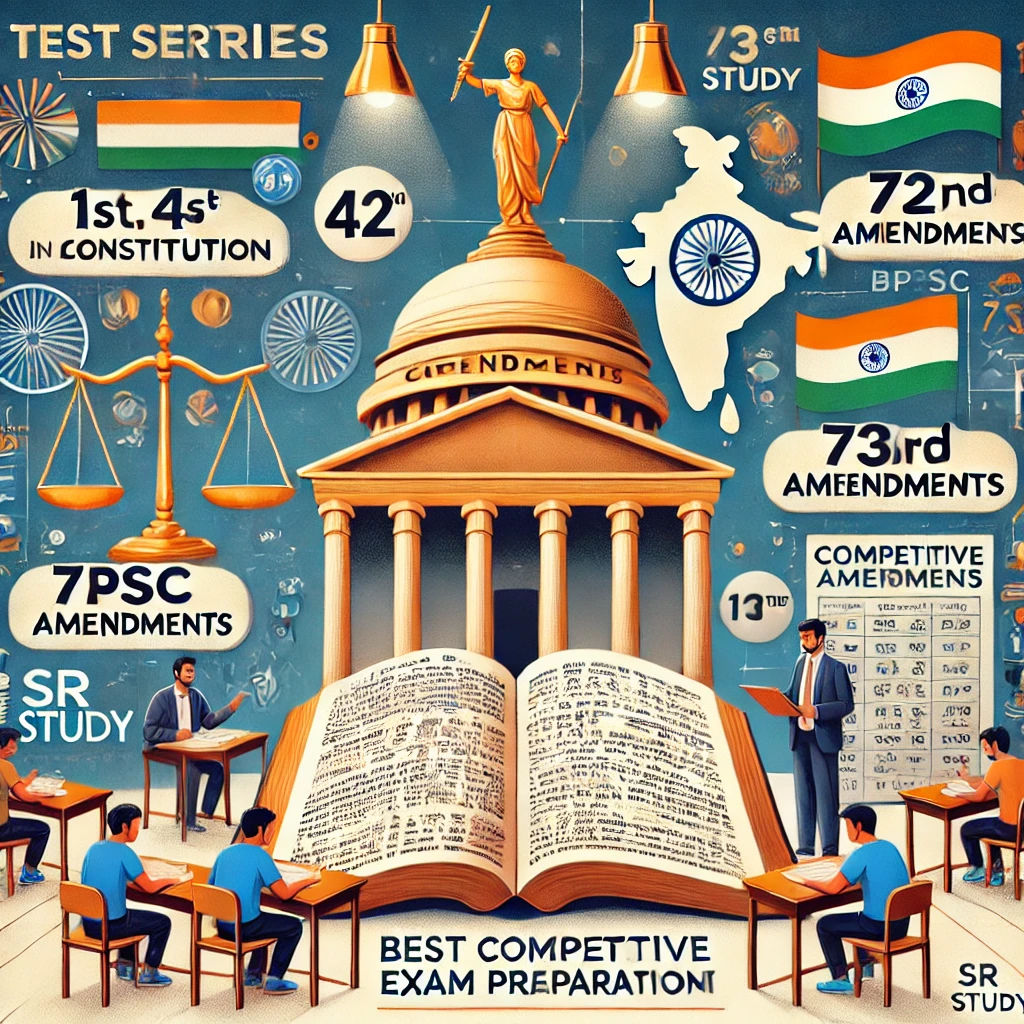Master All Amendments of the Indian Constitution: Key Points for UPSC, UPPSC, BPSC, RPSC, and All State Exams
If you’re preparing for competitive exams like UPSC, UPPSC, BPSC, RPSC, or any other state-level exams, understanding the amendments to the Indian Constitution is crucial. Indian polity forms a significant portion of the syllabus in these exams, and questions on amendments are common. In this blog, we’ll cover the key amendments that every aspirant needs to know, along with a special mention of SR Study, your go-to platform for the best test series to boost your preparation.
What is a Constitutional Amendment?
The Indian Constitution, adopted in 1950, provides a mechanism to adapt and evolve through amendments. The process of amendment is outlined in Article 368, ensuring the Constitution remains relevant to changing times and needs.
Types of Amendments:
- Simple Majority (not covered under Article 368)
- Special Majority (under Article 368)
- Special Majority with Ratification by Half of the States
Key Constitutional Amendments You Must Know
1. 1st Amendment Act, 1951
- Significance: Added 9th Schedule to protect laws from judicial review.
- Key Changes: Restrictions on the right to free speech, protection for land reforms.
2. 7th Amendment Act, 1956
- Significance: Reorganized states on a linguistic basis.
- Key Changes: Abolished the distinction between Part A, B, C, and D states.
3. 10th Amendment Act, 1961
- Significance: Incorporated Dadra and Nagar Haveli as a Union Territory.
4. 11th Amendment Act, 1961
- Significance: Changed the procedure for the election of the Vice President.
5. 12th Amendment Act, 1962
- Significance: Incorporated Goa, Daman, and Diu as Union Territories.
6. 14th Amendment Act, 1962
- Significance: Added Puducherry to the Indian Union.
7. 21st Amendment Act, 1967
- Significance: Added Sindhi as the 15th official language.
8. 24th Amendment Act, 1971
- Significance: Affirmed Parliament’s power to amend any part of the Constitution.
9. 25th Amendment Act, 1971
- Significance: Curtailed the Right to Property.
10. 26th Amendment Act, 1971
- Significance: Abolished privy purses for former rulers.
11. 31st Amendment Act, 1973
- Significance: Increased the number of Lok Sabha seats from 525 to 545.
12. 42nd Amendment Act, 1976
- Significance: Known as the “Mini-Constitution”.
- Key Changes: Added terms “Socialist,” “Secular,” and “Integrity” to the Preamble; curtailed judicial review and strengthened the Directive Principles.
13. 44th Amendment Act, 1978
- Significance: Reversed many changes made by the 42nd Amendment.
- Key Changes: Restored the Right to Property as a legal right.
14. 52nd Amendment Act, 1985
- Significance: Introduced the Anti-Defection Law.
15. 61st Amendment Act, 1989
- Significance: Reduced the voting age from 21 to 18.
16. 73rd Amendment Act, 1992
- Significance: Established the Panchayati Raj system.
17. 74th Amendment Act, 1992
- Significance: Provided for Urban Local Bodies (Municipalities).
18. 86th Amendment Act, 2002
- Significance: Made Right to Education a Fundamental Right for children aged 6-14.
19. 97th Amendment Act, 2011
- Significance: Added the right to form cooperative societies.
20. 101st Amendment Act, 2016
- Significance: Introduced the Goods and Services Tax (GST).
Why Knowing These Amendments is Important
Competitive exams like UPSC CSE, State PSCs (UPPSC, BPSC, RPSC, MPPSC, etc.), and others like SSC CGL, Railways, and Banking Exams frequently test knowledge of constitutional amendments. Mastering these amendments helps you score high in subjects like Polity, Governance, and Current Affairs.
How SR Study Can Help You Succeed
To crack these competitive exams, practice is key! SR Study provides:
- High-Quality Test Series for UPSC, UPPSC, BPSC, RPSC, and other state exams.
- Detailed Explanations and Performance Analysis to track your progress.
- Current Affairs Integration to keep your preparation updated.
With SR Study, you get the best resources to stay ahead in your exam preparation.
Conclusion
Understanding the amendments to the Indian Constitution is essential for any serious aspirant. Focus on these key amendments, practice consistently with platforms like SR Study, and you’ll be well on your way to success in your desired exam.
For more tips, resources, and test series, visit SR Study today and give your preparation the edge it needs!



